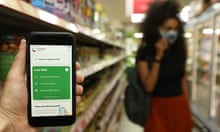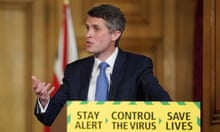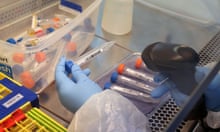The NHS is making preparations to roll out its Covid-19 contact-tracing app nationwide before the end of the month, the Guardian understands.
The smartphone app, which alerts people if they have come into contact with an individual who has reported coronavirus symptoms, is being trialled on the Isle of Wight and is a key part of the government’s “test, track and trace” strategy as the country eases out of lockdown.
The health secretary, Matt Hancock, previously said the app, which has been beset by privacy issues, fears about its uptake among older people and concern that it may be dropped entirely, would be released nationwide in mid-May.
The Guardian has been told, however, that the wider public in England will now have to wait until at least the week commencing 25 May.
The app was first made available to NHS workers as part of the Isle of Wight trial earlier this month, but the Department of Health and Social Care declined to clarify whether the same strategy would be used in the nationwide rollout. A spokesman said: “We intend to roll out the NHS Covid-19 app across the country for everyone to use in the coming weeks.”
A Downing Street spokesman said: “We said the pilot would last for three weeks or so, and that remains the case.”
Experts have cautioned that as many as 10 million people in the UK risk being locked out of using the app because of a “digital divide”, putting potential constraints on their ability to work and safeguard their health. The Commons culture, media and sport committee heard that almost 2 million households do not have internet access. A further 7 million “have used the net, but have very basic skills, like not knowing how to open an app”.
The government needs 60% of the population to download the app for it to work effectively. The transport secretary, Grant Shapps, told the Downing Street daily press conference on Thursday that 72,300 people, or about half of the Isle of Wight’s population, had downloaded it so far during the trial.
The island’s MP, Bob Seely, said however that the NHSX digital unit had told him there had been about 52,250 unique downloads, and that some had come from elsewhere, including mainland UK.
The Tory MP told the Guardian this was a strong result, given that only around 80,000 people on the island were able to download the app if children and those with older phones or incompatible models were taken into account. “It is enough to make the test a significant success,” he said. “Because anything over 20% [of the population downloading it] is useful, 50% you’re getting exponential effect on the virus, but once you’re up in the mid-60s, that is really superb.
“Clearly, what I would like is to drive that to three-quarters. because then it would make us safer, and it’s an even better model to learn from … But we’re probably in the mid-60s, maybe a bit higher.”
The app uses Bluetooth technology to register when people come into close contact with each other. It relies on users to flag when they develop symptoms, then uses a central database to alert others with whom they have come into contact that they are at risk of infection so that they can self-isolate and get tested if necessary.
The prime minister’s official spokesman said: “Well over half the population [on the Isle of Wight] have downloaded the app. We said the pilot would last for three weeks or so, and that remains the case. As issues have been coming up, we are ironing those out. The current intention is to go from the Isle of Wight to nationwide rollout.”
Hancock has been receiving daily progress updates, he said. Asked whether it would be rolled out to Scotland, he replied: “It will be a matter for the Scottish government. It will be available, but public health is a devolved matter.” He also said the 18,000 contact tracers Hancock had promised would be in place by the end of next week.
A DHSC source, however, said no decision had been made on the exact timing of the rollout, that the Isle of Wight pilot was still being assessed, and that some areas of the county may be granted access before the whole population.
A DHSC spokesman said: “We will be closely studying this first phase of the rollout, and expect to refine and improve the NHS Covid-19 app based on the feedback we receive from those taking part. Like any high-quality app, we will continually evolve and improve the app over the coming weeks.”








